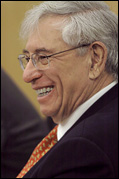Press Release
New Bioengineering Dept. Established by Gift of $30 Million from Renowned Biomedical Inventor
FOR IMMEDIATE RELEASE January 1, 2006
CONTACT:
Lee Tune
301 405 4679
ltune@umd.edu

Dr. Robert E. Fischell.
COLLEGE PARK, Md. - Through his invention of life-saving medical devices, Robert Fischell has saved or improved the lives of millions of people. Now, he is giving $30 million to the University of Maryland's A. James Clark School of Engineering so that future generations of Maryland bioengineers can follow in his footsteps.
His gift, one of the three largest ever received by the university, will establish the Fischell Department of Bioengineering and the Robert E. Fischell Institute for Biomedical Devices in the Clark School. In a separate gift, Fischell's sons, David, Tim and Scott are giving an additional $1 million to support the new department and institute. The Fischell Department of Bioengineering is the university's first named academic department.
Robert Fischell's commitment is the third $30 million gift the University of Maryland has received this year, two of which have gone to the Clark School. In February, longtime Maryland supporters A. James Clark and Robert H. Smith each gave the university $30 million.
"The finest goal that engineering can achieve is to improve the quality of life for people throughout the world," said Fischell. "Our gifts to the Clark School will help engineering students develop their ideas to improve health care for millions of human beings."
University of Maryland President C.D. Mote Jr. and Clark School Dean Nariman Farvardin announced the gifts today at a ceremony in the school of engineering's new Jeong H. Kim Engineering Building.
"The university is fortunate indeed to have the friendship of Bob Fischell and his sons as it upgrades its graduate program into a department of bioengineering," said President Mote. "The opportunity to create the Robert E. Fischell Institute for Biomedical Devices opens a new chapter in the marriage of engineering and medicine with sharp focus on creating devices to enhance the quality of human life. In the years ahead similar institutes will emerge around the country."
Inventing the Future
Scientist and engineer Robert Fischell has had two pioneering careers, his current one inventing life-saving medical devices, and a former one helping create the modern era of space satellites so critical to communications, entertainment, business and national security.
Fischell, who holds more than 200 patents, is the father of modern medical stents, lifetime pacemaker batteries and implantable insulin pumps. He is also the father of his closest collaborators: sons David, Tim and Scott, who share his passion for changing the world through inventive genius, hard work and philanthropy.
One of the latest results of their collaborations is a pacemaker-sized implantable computer that provides the earliest possible warning of impending heart attack. Fischell founded Angel Medical Systems Inc., where son David is CEO, to bring this technology into use. Named by his granddaughter Jennifer Fischell, Angel Medical is one of more than half a dozen companies, including Pacesetter Systems, IsoStent, NeuroPace, and NeuraLieve, that Fischell has founded since 1969 to develop his inventions. NeuroPace is developing a new implantable device for ending epileptic seizures. NeuraLieve is developing a magnetic pulse device that stops migraine headaches.
Fischell—who serves on the Board of Trustees of the University of Maryland, College Park Foundation and on the Clark School of Engineering Board of Visitors—has a Master of Science in physics and an honorary Doctor of Science from the University of Maryland.
The establishment of the new Fischell Department of Bioengineering and Robert E. Fischell Institute for Biomedical Devices is a major step in the Clark School's continuing rise into the ranks of the nation's premier engineering schools.
"These new efforts allow the Clark School to offer new research and educational capabilities in health care, one of engineering's major growth areas," said Dean Farvardin. "We will be able to apply our well-established cross-disciplinary methods and facilities to create exciting new approaches to health-related engineering involving ideas and insights from all of our engineering disciplines. We expect to attract and bring together top faculty and students as well as industry and government partners interested in this field in collaborative efforts that will produce significant economic benefits to the state, region and nation."
The University of Maryland's A. James Clark School of Engineering, one of the premier engineering schools in the United States, currently offers 13 graduate and 11 undergraduate programs, two degree programs for working professionals and one certification program. Admission to the new undergraduate bioengineering program to be offered through the Fischell Department of Bioengineering will start in the fall of 2006.